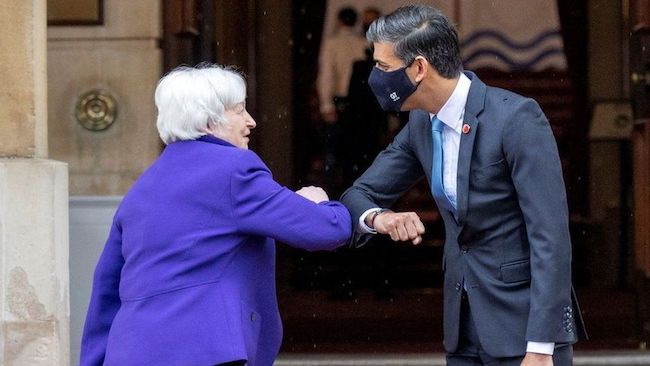
Most of the world’s nations have signed up to a historic deal to ensure big companies pay a fairer share of tax.
Some 136 countries agreed to enforce a corporate tax rate of at least 15%, as well a fairer system of taxing profits where they are earned.
It follows concern that multinational companies are re-routing their profits through low tax jurisdictions to cut their bills.
Yet critics say a 15% rate is too low, and firms will get around the rules.
UK Chancellor Rishi Sunak said the deal would “upgrade the global tax system for the modern age”.
“We now have a clear path to a fairer tax system, where large global players pay their fair share wherever they do business,” he said.
The Organisation for Economic Cooperation and Development (OECD), an intergovernmental organisation, has led talks on a minimum rate for a decade.
It said the deal could bring in an extra $150bn (£108bn) of tax a year, bolstering economies as they recover from Covid.
Yet it also said it did not seek to “eliminate” tax competition between countries, only to limit it.
The floor under corporate tax will come in from 2023. Countries will also have more scope to tax multinational companies operating within their borders, even if they don’t have a physical presence there.
The move – which is expected to hit digital giants like Amazon and Facebook – will affect firms with global sales above 20 billion euros (£17bn) and profit margins above 10%.
A quarter of any profits they make above the 10% threshold will be reallocated to the countries where they were earned and taxed there.
“[This] is a far-reaching agreement which ensures our international tax system is fit for purpose in a digitalised and globalised world economy,” said OECD Secretary-General Mathias Cormann.
“We must now work swiftly and diligently to ensure the effective implementation of this major reform.”
Winners and losers’
This deal marks a sweeping change in approach when it comes to taxing big global companies.
In the past, countries would frequently compete with one another to offer an attractive deal to multinationals. It made sense when those companies might come in, set up a factory and create jobs. They were, you could say, giving something back.
But the new digital era giants have become adept at simply moving profits around, from the regions where they do business to those where they will pay the lowest taxes. Good news for tax havens, bad news for everyone else.
The new system is meant to minimise opportunities for profit shifting, and ensure that the largest businesses pay at least some of their taxes where they do business, rather than where they choose to have their headquarters.
Some 136 countries have signed up – an achievement in itself. But inevitably there will be losers as well as winners.
Source: BBC























